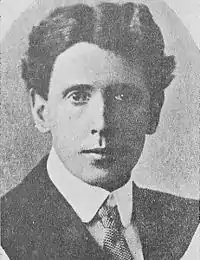Silyn Roberts
Robert "Silyn" Roberts (28 March 1871 – 15 August 1930) was a Welsh clergyman, writer, teacher and pacifist.
Silyn Roberts | |
|---|---|
 Silyn Roberts, ca. 1890 | |
| Born | Robert Roberts 28 March 1871 Llanllyfni, Wales |
| Died | 15 August 1930 (aged 59) Bangor, Wales |
| Nationality | Welsh |
| Period | 20th century |
History
Roberts, a Calvinistic Methodist minister, was a noted Welsh-language poet, the winner of the Crown at the 1902 National Eisteddfod of Wales with his poem "Trystan ac Esyllt".[1] Born in Bryn Llidiart, Llanllyfni, Caernarvonshire, he had worked as a slate quarryman before attending the University College of North Wales, Bangor, and Bala Theological College. From 1901 until 1912 he was a Calvinistic Methodist minister firstly in Lewisham, London and then in Tanygrisiau, Blaenau Ffestiniog, Merionethshire.
While living in London in the early 1900s Roberts met and befriended Lenin.[2]
A Socialist and a close associate of the academic and politician William John Gruffydd, Roberts represented the Labour Party on Merioneth County Council. In collaboration with Thomas Jones, he campaigned for adult education opportunities, and founded a branch of the Workers Educational Association in North Wales. He also supported the campaign against tuberculosis in Wales.[3]
Works
Poetry
- Telynegion (1900)
- Trystan ac Esyllt a Chaniadau Eraill (1904)
Fiction
- Llio Plas y Nos (1945)
Non-fiction
- Y Blaid Lafur Anibynnol, ei Hanes a'i Hamcan (1908)
Translations
- Gwyntoedd Croesion (translation of Cross currents by J.O. Francis; Educational Pub. Co., 1924)
- Bugail Geifr Lorraine (translation of Le chevrier de Lorraine by Émile Souvestre; Hughes a'i Fab, 1925)
Sources
- Roger Simpson (2008). Radio Camelot: Arthurian Legends on the BBC, 1922-2005. DS Brewer. pp. 16–. ISBN 978-1-84384-140-1.
- Silyn (Robert Silyn Roberts) 1871-1930 by David Thomas, Gwasg y Brython, 1956.
- Thomas, David. "Roberts, Robert (Silyn)". Welsh Biography Online. Retrieved 21 April 2012.